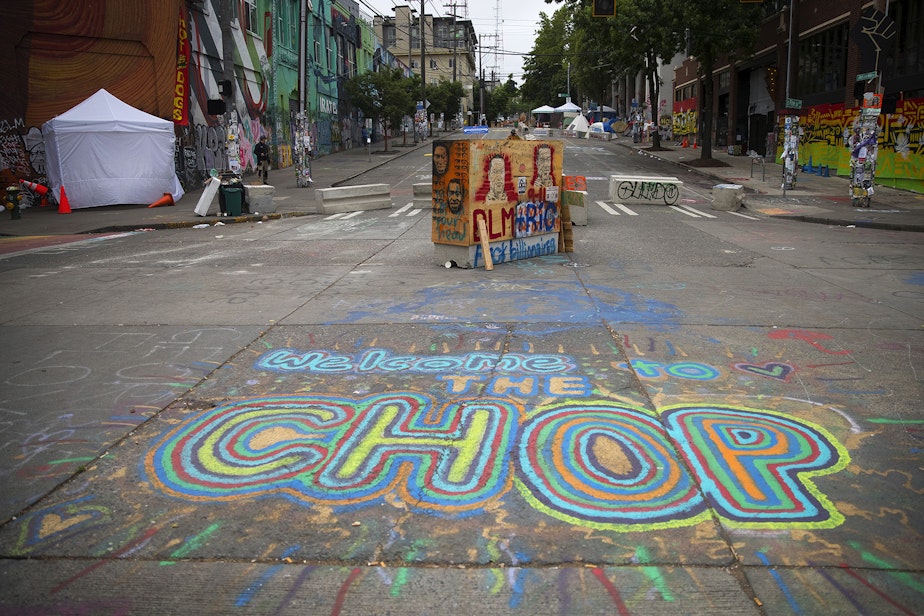Review: '11th and Pine' aims to capture the goings-on of CHOP. Does it succeed?

As journalists, we’re often expected to cover stories dispassionately — hiding our own thoughts and concerns out of fear of appearing biased.
But we’re also humans, with life experiences, perspectives, and emotions. And sometimes we can’t help but be affected by what we see.
That may be especially true if you’re covering the arts — things that are intended by their very nature to evoke an emotional response.
KUOW arts reporter Mike Davis recently reported on a piece that sent him on a bit of a journey.
Sponsored
I
n June of 2020, in the midst of a global pandemic, in the wake of George Floyd’s murder, and during a time when the whole country seemed to be engulfed in protest, Seattle found itself at the center of the national news cycle.
News surrounding the Capitol Hill Occupied Protest, also known as the CHOP, dominated headlines. People across the nation and even the world witnessed the standoff between protesters and police at Seattle’s East Precinct.
As someone who was here, working for the Seattle Office of Arts and Culture at the time, I had conflicting emotions when I heard someone was going to create a play to portray that moment in Seattle's history.
I wanted to be excited. This is a story that I lived — one I believed should be told. But I was also worried and filled with anxiety, because I know stories are shaped by the perspective of the person telling it.
Sponsored
So, I reached out to Nikki Yeboah. Yeboah wrote “11th and Pine,” a play that chronicles events of the CHOP.
"11th and Pine" is a piece of documentary theater. That means it focuses on real, oftentimes tragic events, and typically uses dialogue containing verbatim accounts from real people who were present during those events. It takes a lot of work to pull off, but documentary theater can be a dynamic experience.
Yeboah has seen success by taking up this medium. In 2017, while living in San Diego, she wrote “The Mothers,” a documentary style play telling the story of four mothers who lost sons to police violence in California. The play received positive reviews and was staged at theaters around the country. And then, in the summer of 2020, Yeboah became aware of the CHOP protests here in Seattle.
“I was pretty amazed — I'm pretty impressed that a protest could be sustained for that long," she said. "In California, where I was, they were sustained for a while, like they were all over the country. But Seattle, it just kept going, and kept going, and kept going. So weirdly enough, when a job opportunity came here, and I took it, I remember the first thing on my mind was like, 'I wonder whatever happened to those protesters...I wonder how [CHOP] changed the city.'”
After Yeboah moved to Seattle, and got a chance to meet and interview people connected to the CHOP, it "fully hit" her what people had gone through, she said.
Sponsored
"It's a very difficult history; a lot of people are traumatized by it still — there was a lot of violence. There was a lot of gaslighting...and people still feel very strongly about it."
Yeboah used the stories of 29 interviewees as the foundation for her play. She put together a staged reading that ran for three nights; I went to see the performance.
That night, when I left the theater, I was upset. And I wasn’t the only one.
I watched as people got up and left during the reading. They never returned. I know some of those people, and when I asked why they left, I received many answers.
One person heard words they had spoken in the interview process spoken by a character on stage, and their quote was met by laughter in the audience. Another person was triggered by the representation of the protesters. What took place on stage wasn’t the story many of us remembered. The characters in the play didn’t feel like accurate representations of the people we knew.
Sponsored
This play was meant to be a representation of history, but for me, there was no way for these events to feel "historical." We still remember what happened, and we know people who are still traumatized.
I attended the performance thinking I would see stories I connected with. But I left feeling like the portrayal of many protestors, who were composite characters representing multiple viewpoints, missed the mark. They were portrayed as outsiders, coming to Seattle to take part in their first-ever protest.
Where were the activists who had been protesting police violence right here in Seattle for years? And where were the community reporters who covered the CHOP every day? They were replaced by incendiary television reporters who dropped in to exploit stories.
Also, I couldn’t help but feel that some of the city’s political leaders were portrayed the most sympathetically — something I know many people would strongly react to.
With so many questions, and so many conversations with people who left the reading with similar feelings, I set out to find answers that would help me process what we had seen.
Sponsored
Listen to the full interview by clicking the play button at the top of this story.






